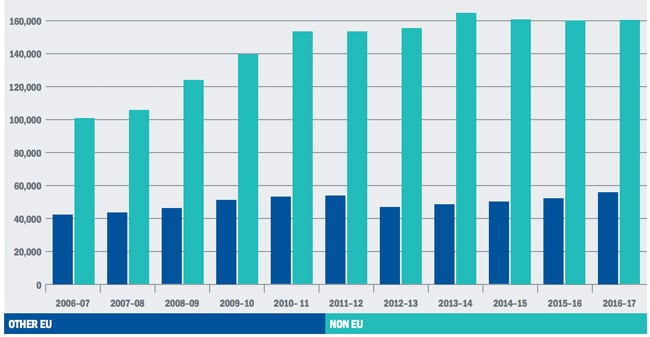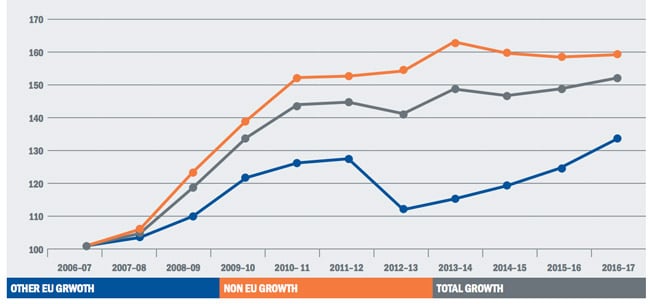Measuring the international competitiveness of British higher education
A new paper commissioned by Universities UK raises some important questions about the international competitiveness of British higher education. In Five Little-known Facts about International Student Mobility to the UK, Education Insight Founder Janet Ilieva argues that, “The global appeal of UK higher education is a national asset,” and that, “Preserving and building on it should be a national priority.”
The analysis presented throughout the paper, however, paints a picture of declining competitiveness over the past decade. “International student mobility flows to the UK decelerated significantly in the aftermath of the global financial crisis of 2008/09,” notes the report. Indeed, and as the following chart reflects, foreign enrolment in British higher education has been essentially flat since 2010/11.


Building competitiveness
Ms Ilieva closes her paper for Universities UK with a call for greater coordination in international marketing between the country’s higher education institutions and the British government. She adds, “This should include better post study work opportunities, best and more comprehensive promotion of the UK as a study destination; better understanding of the factors affecting demand, particularly at postgraduate level; and a better understanding of the links between [transnational education, or TNE] and onshore recruitment and of the opportunities provided by TNE to diversify the reach of UK higher education in geographical terms.” This recommendation is grounded in a number of important market factors, including the pending impact of Brexit (and any resulting changes in fee status for EU students in the UK), the policy and political climate in the US (including any changes to post-study work rights for international students), and ongoing fluctuations in world currency and commodities markets. In commenting on the report, Universities UK International Director Vivienne Stern said: “International students bring vitality and diversity to our campuses and we hugely value the contribution they make to our institutions. The facts in this report…indicate the need for a government-led international education strategy that can help the sector create an environment that attracts and retains talented international students.” For additional background, please see:
Most Recent
-
How have changes in policy settings impacted international student recruitment at Australian universities? Read More
-
ICEF Podcast: Together for transparency – Building global standards for ethical international student recruitment Read More
-
New analysis sounds a note of caution for UK immigration reforms Read More
















